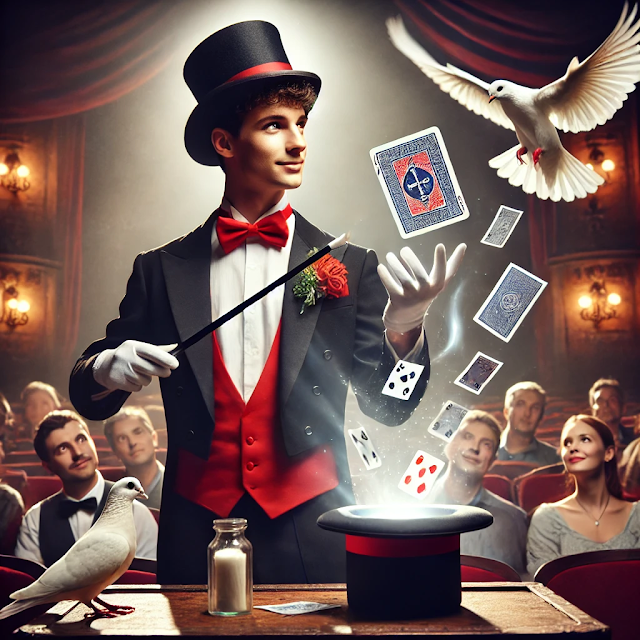Ever wonder how magicians manage to baffle us, even when we're on high alert? It’s not because they’ve got supernatural powers, though that would be convenient. Instead, magicians have refined the art of manipulating human psychology to an absurdly precise degree. Let’s break down the six psychological secrets these sorcerers of sleight use to make you feel like a gullible little goose in the palm of their hand. Don’t feel bad; it happens to the best of us.
1. They Count on Your Terrible Memory
Memory? Oh, that thing you’re sure you’ve got under control? Think again. Humans are “cognitive misers,” says Anthony Barnhart, a psychologist and professional magician, which sounds like a great excuse for lazy thinking. Our brains love taking shortcuts to save energy, which is why we don’t remember every mundane detail — just the highlights and the big finish. Magicians exploit this by subtly rewriting our memories to fit their tricks. They’ll recap the trick, but with a twist: they might reorder events, add a bogus detail, or leave something out. Voilà — you “remember” exactly what they want.
So next time a magician says, “Remember when I showed you the card?” pause and wonder: Did they actually show you? Odds are, they didn’t. But hey, memory is overrated anyway, right?
2. Honesty? Pfft, Not Really
Contrary to popular belief, magicians rarely lie outright. Instead, they rely on paltering, a delightfully manipulative practice of misleading without technically fibbing. Think of it like when your friend asks if you like their new, questionable haircut, and you respond, “Wow, it’s unique!” Did you lie? No. Did you mislead? Absolutely.
Magicians use paltering to get you to lie to yourself. They might show you a handful of cards, and your brain just fills in the rest. Who needs an honest magician? That would be a very short show.
3. They Know Your Attention Is Terrible
Imagine your attention span as a flashlight in a pitch-black room. Neuroscientists tell us that attention is selective; we can’t process all stimuli simultaneously. This explains why, when Daniel Roy (magician and neurobiology buff) asks, “What’s the sensation in your left toe?” you’re suddenly aware of that toe, which you forgot you had a second ago.
Magicians take advantage of our distractibility by controlling our “spotlight” attention. Roy might make a grand flourish over here so you focus on it, while his sneaky left hand is doing something downright devious just out of sight. It's a classic "look over here, not over there" scenario. And we fall for it every time.
4. They Count on Your ‘Inattentional Blindness’
If you’ve ever been so engrossed in your phone while walking that you nearly walked into a lamppost, you’ve experienced inattentional blindness. This charming little quirk of human perception means that you can be looking right at something and completely miss it if you’re focused on something else.
Magicians turn this into an art form. For example, in the famous “Invisible Gorilla” study, participants were so focused on counting basketball passes that they missed a gorilla strolling through the scene. Likewise, when a magician casually asks, “What’s your name?” they’re not merely making polite small talk; they’re setting you up for a trick. During that brief interaction, your attention is so intensely focused on answering that you miss the sleight of hand happening right in front of you. That’s right — your manners are being weaponized against you.
5. They Manipulate Your Perception of What Matters
A good magic trick unfolds like an intriguing movie plot. You know the big finish is coming, but you’re clueless about how it’ll get there. This uncertainty lets magicians steer your attention precisely where they want it, making it nearly impossible to figure out how the trick works.
When Roy, for example, hands you a pen and insists you write your name in big, bold letters, he might be creating a spectacle. Why? So he can make a sneaky move with his other hand. It’s all part of an elaborate routine that’s as layered as a psychological lasagna. Every word, every gesture is calculated to make you think you’re in control — spoiler: you’re not.
6. They Stack Psychological Tricks Like a Jenga Tower
If you thought magic tricks were simple, you’ve been hoodwinked already. Successful magicians don’t just rely on a single tactic but layer multiple techniques. This stack of psychological ploys ensures that even if you see through one trick, there’s another (and another) waiting to trip you up.
Imagine trying to focus on the memory manipulation and the paltering and the misdirection all at once. Yeah, good luck with that. You’d need a whole neuroscience degree just to keep up, and even then, the magician’s got a half-dozen other techniques up their sleeve.
In summary, don’t beat yourself up for falling for a magic trick. Magicians aren’t pulling one over on you because you’re simple-minded; they’re just masters of exploiting how our brains naturally operate. So the next time you see a magician perform, remember: you’re not watching someone break the laws of nature. You’re watching a very talented person break the laws of psychology.
And frankly, it’s a bit magical.
